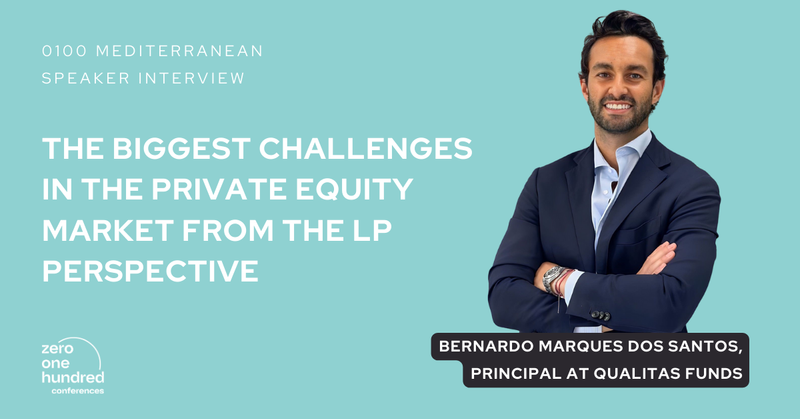In this Speaker Interview with Bernardo Marques Dos Santos, Principal at Qualitas Funds, we delve into one of the most relevant topics in private equity for most of the GPs: the LP perspective. Bernardo will be a featured speaker at the upcoming 0100 Conference Mediterranean, participating in the panel discussion titled "Insights From LPs: Current Challenges and Opportunities in the PE Market," alongside industry experts Ana Hernandez del Castillo from Crescenta, Claudio Dimarco from Lunelli Holding, and Cesare Buzzi Ferraris from SwanCap.
Here’s a sneak peek into the trends and outlook shaping the LP agenda in private equity investing.

From your perspective as an LP, what are the most pressing challenges you're currently facing in the private equity market? Conversely, what opportunities do you see emerging in the next 12-18 months?
The biggest challenge is clearly the delay in asset exits. This is mainly because there's a mismatch between their price expectations and what the market is willing to pay. In many cases, GPs hold assets for more than five years, and this extended holding period isn’t always accretive to the investment. Without a clear value creation strategy — such as a buy-and-build play — keeping a company longer may not add value.
For LPs, it's often better to realize the asset at a slightly lower value now than to wait 12-18 months for a marginal increase in return. For instance, it may be better to exit at 2.7x now rather than wait for 3x in over a year. I believe carry incentives play a significant role in this decision-making process, as GPs are paid based on the multiple on invested capital (MoIC) once the minimum IRR threshold is reached. To raise future funds, GPs need to remain disciplined and not fear selling companies at 2.5-2.7x when appropriate. That’s been our main challenge from an LP perspective.
Do you think this is a recent trend, or has it been developing over the past few years?
This trend of delaying exits has become noticeable over the last year. It's largely driven by difficulties in accessing leverage for large funds and the perception that multiples have decreased. Many GPs initially paid higher entry multiples, so they need higher exit multiples to justify their returns. It's a situation influenced by several factors, and hopefully, with declining interest rates, this issue will improve. But right now, it's a significant trend in the market.
How have institutional allocations to private equity evolved in recent years, particularly in comparison to venture capital?
The dynamics vary depending on the asset class, but the trend is largely similar. There's been less capital from institutional players, ourselves included. Many institutions, including ours, have shifted focus from institutional investors to high-net-worth individuals (HNWIs) and family offices. This shift is due to the combined effects of the denominator effect, a crowded market due to the increase in average fundraising periods, and a lack of distributions. All of this has made fundraising more challenging for funds.
How are you attracting new private investors, given the challenges in engaging institutional investors in alternative assets?
We have strong partnerships that help us in this area. In addition, we focus on proximity and training with financial advisors, ensuring our products are easy to understand and offer an attractive risk-return profile. For example, we target an IRR of 15-18%, which is appealing to investors interested in illiquid products, due to diversification and cashflow predictability.
When you’re fundraising, do you have specific criteria or requirements regarding impact investing?
Yes, we are an Article 8 fund, and impact is relevant for many of our investors, especially institutional ones. As a fund of funds, we don’t directly influence companies, but we put processes in place to ensure the funds we invest in meet the necessary impact criteria.
There’s been increasing talk about the democratization of private equity, opening access to a broader range of investors. What’s your view on this trend, and how might it affect your investor base and strategy?
There's definitely a democratization happening in private equity, with access expanding from large investors, like pension funds and big family offices, to smaller investors with entry points as low as $10k. The number of investors has increased significantly, and this trend is supported by a new generation—millennials—who are more informed and comfortable with private equity investments. The availability of data and structured firms has made it easier for them to participate.
Funds of funds also play a key role in this democratization by offering diversified portfolios with more predictable cash flows, which is crucial for smaller investors who can’t commit to the ticket sizes or volatility of direct fund investments.
You focus on mid-sized private equity firms. Why do you prioritize this segment over larger firms, which traditionally offer higher returns?
Actually, it’s the opposite. As you move down in fund size, returns tend to follow the opposite trend. We are strong advocates of the Lower Mid-market because of the unbalance in supply and demand of capital and the fact that most of those companies are virgin of private capital. This would result in a more likely multiple arbitrage – at entry acquisitions multiples are significantly lower - and an easier path to value creation on the daily operations.
The mid-market, on the other hand, is frequently overlooked because these funds occupy a difficult position. They must acquire from smaller funds and rely on selling to larger ones, making them more sensitive to market conditions and prone to greater volatility.
What does it mean for Qualitas to be part of P10 now?
P10 is a consolidator of asset managers, with the goal of building a stronger franchise in the lower mid-market. For us, it means continuing to focus on our strategy in Europe while benefiting from the financial power of a larger institution. Fundraising will likely become easier with the backing of P10, while we maintain our focus on investing in the lower mid-market and excel in investing in Europe.

